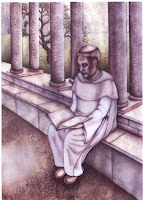 Over the years, the Catholic Church in Korea has in many ways attempted to get Christians to take more interest in reading. In 2007, on the 80th anniversary of the launching of the Catholic Times, a survey of Christians showed that 58.6% had not read even one book related to the Church during the year. Despite an increase in the number of Christians, spiritual maturity has not kept pace with external growth.
Over the years, the Catholic Church in Korea has in many ways attempted to get Christians to take more interest in reading. In 2007, on the 80th anniversary of the launching of the Catholic Times, a survey of Christians showed that 58.6% had not read even one book related to the Church during the year. Despite an increase in the number of Christians, spiritual maturity has not kept pace with external growth.Efforts in the past have not been successful in fostering a reading culture within the Church. The Bishops' Mass Media Committee and the Catholic Times have tried and ultimately failed. Campaigns to rectify the problem succeed for a period of time but with no lasting results once the campaigns come to an end.
The importance of reading books that give spiritual life and maturity to our Christians cannot be overemphasized. The foundation for the start of the Catholic Church of Korea was built with books from China. Two books, especially, had a profound effect: a catechism by Matteo Ricci and the other, on the seven capital sins and the virtues to overcome them by Diego Pantoja.
In 2005, more than 1000 Christians participated in a program to get everyone to read 33 books in 3 years. At the end of the campaign everyone went back to the normal routine--life without books. It is not sufficient, obviously, to have campaigns that only work when the need to read more is being actively promoted. A change in the reading habits of Catholics is needed.
In pursuit of this goal, the bishops' committee and the Catholic Times will set up a committee to train leaders for the different parishes, produce pastoral guidelines for ongoing reading programs, and publicize these efforts weekly in the Catholic Times.
Reading is a very important part of our growth as Christians. The importance of the Scriptures for our faith life, in deepening our faith and bringing passion into our lives, is obvious. The head of the bishops' committee hopes that the parish leaders will put in place a more reader-friendly environment, with the priests in the parish taking an active role as readers, recommending books and, ultimately, bringing about the publication of more and better books, and enabling synergic growth of mature Christians in the years ahead.





